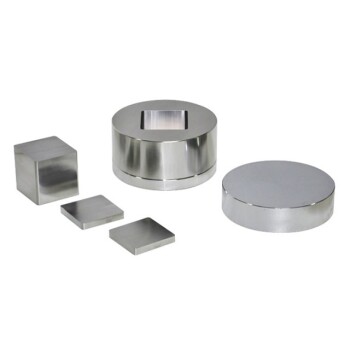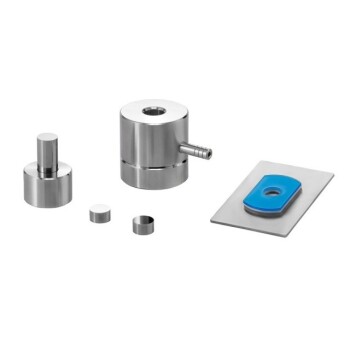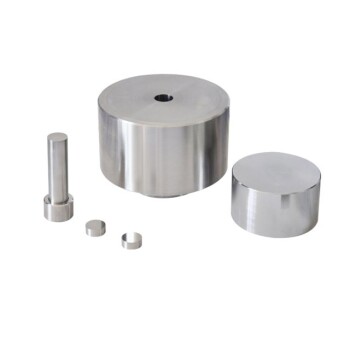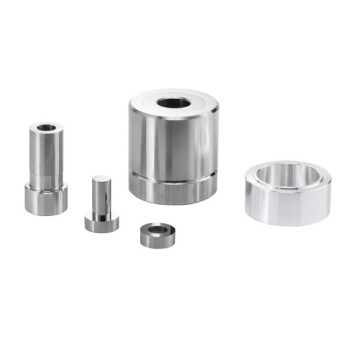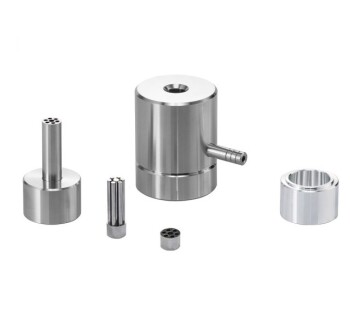The primary challenges in textile recycling stem from the sheer variety and complexity of modern fabrics. Issues like material contamination, mixed fiber types, moisture absorption, and non-textile components like zippers and buttons create significant hurdles. Laboratory presses, such as the LabEcon press, play a critical role by preparing these inconsistent recycled materials into standardized samples, which are essential for quality control and analysis.
The core problem in textile recycling isn't just collection, but ensuring the recycled material is reliable enough for new products. Laboratory presses are a key tool for bridging this gap, enabling the precise analysis required to certify the quality and performance of recycled fabrics.

The Core Challenges of Textile Recycling
To understand why recycling textiles is so difficult, we must first appreciate the nature of the waste stream. Unlike materials like glass or aluminum, textiles are not a uniform commodity.
The Problem of Mixed Materials
Most modern garments are not made of a single fiber type. They are often blends of natural fibers (like cotton) and synthetic fibers (like polyester or elastane).
Separating these intertwined fibers at a chemical or mechanical level is technically complex and expensive, making it a major barrier to high-quality recycling.
Contamination and Impurities
Used textiles are rarely clean. They can be contaminated with dirt, oils, chemicals, and other residues from their previous life.
These impurities can interfere with the recycling process and degrade the quality of the final recycled fiber, making rigorous testing essential.
Moisture and Material Degradation
Textiles, especially natural fibers like cotton, readily absorb moisture. If not stored properly, this can lead to mold, mildew, and bacterial growth.
This degradation breaks down the fibers, reducing their strength and making them unsuitable for creating durable new textiles.
The Issue with Non-Textile Components
Buttons, zippers, rivets, and printed labels are not part of the fabric but are attached to it. These items must be removed before mechanical or chemical recycling can begin.
Failure to remove them can damage recycling machinery and contaminate the entire batch of recycled material, highlighting the need for careful pre-processing and inspection.
How Laboratory Presses Enable Quality Control
A laboratory press is a foundational tool for turning inconsistent recycled textiles into a known quantity. Its primary role is to prepare uniform samples for analysis.
Creating Standardized Test Samples
The press uses heat and pressure to flatten and consolidate recycled fabric or fiber into a consistent shape and density.
This standardization is crucial because it ensures that any subsequent tests are measuring the properties of the material itself, not variations in the sample's preparation.
Preparing for Microscopy Analysis
By pressing recycled fibers into a flat sheet, researchers can more easily examine the material under a microscope.
This visual analysis helps identify fiber length, check for damage, detect remaining contaminants, and verify the consistency of fiber blends.
Preparing for Mechanical Testing
The standardized samples created by the press are used in machines that test for mechanical properties like tensile strength, tear resistance, and durability.
These tests are non-negotiable for determining if the recycled material is strong enough to be used in a new product and for what application (e.g., insulation vs. new yarn).
Understanding the Limitations
While laboratory presses are vital, they are part of a much larger and more complex system. Their effectiveness is bound by the context of the overall recycling chain.
The Gap Between Lab and Production
A successful test on a small, lab-prepared sample does not guarantee success at an industrial production scale.
Scaling up the process can introduce new variables and challenges that were not present in the controlled lab environment. The lab press proves what is possible, but engineering is required to make it scalable.
Presses Are Just One Piece of the Puzzle
The most advanced testing protocol cannot fix poor-quality input material. The effectiveness of analysis relies on advancements in other areas.
Better automated sorting technologies to separate fiber types and more efficient methods for removing non-textile components are equally critical for the entire system to work.
Making the Right Choice for Your Goal
Understanding this process allows professionals to focus their efforts where they will have the most impact.
- If your primary focus is material science: Use lab presses to innovate and validate new methods for processing difficult-to-recycle blends, creating the data needed for new circular materials.
- If your primary focus is manufacturing: Incorporate rigorous sample testing to de-risk the use of recycled content and ensure your final product meets performance and quality standards.
- If your primary focus is sustainability strategy: Advocate for investment not just in collection, but in the critical quality control infrastructure needed to create a truly circular textile economy.
Ultimately, this level of precision analysis is what transforms textile waste from a liability into a valuable and reliable resource.
Summary Table:
| Challenge | How Lab Presses Help |
|---|---|
| Mixed Materials | Create uniform samples for consistent analysis |
| Contamination | Prepare samples for impurity detection |
| Moisture/Degradation | Standardize samples for strength testing |
| Non-Textile Components | Enable visual inspection via microscopy |
Ready to enhance your textile recycling quality control? KINTEK specializes in lab press machines, including automatic lab presses, isostatic presses, and heated lab presses, designed to serve laboratories by preparing standardized samples for precise analysis. This ensures reliable testing of recycled materials, helping you achieve higher quality and sustainability in your operations. Contact us today to learn how our solutions can benefit your specific needs!
Visual Guide

Related Products
- Square Lab Press Mold for Laboratory Use
- Laboratory Hydraulic Split Electric Lab Pellet Press
- Lab Infrared Press Mold for Laboratory Applications
- Manual Heated Hydraulic Lab Press with Integrated Hot Plates Hydraulic Press Machine
- Automatic Laboratory Hydraulic Press Lab Pellet Press Machine
People Also Ask
- How to use a laboratory press for ideal neutron transmission? Perfect Your Iron Oxide Nanoparticle Samples
- Why are precision molds necessary for the preparation of gypsum composite samples? Ensure Data Integrity and Accuracy
- How can spare parts for a Laboratory Press be ordered? Ensure Compatibility and Reliability with OEM Parts
- What is the technical significance of using precision cylindrical molds for soil brick research? Achieve Data Accuracy
- How do high-hardness precision molds affect NiO nanoparticle electrical testing? Ensure Accurate Material Geometry
